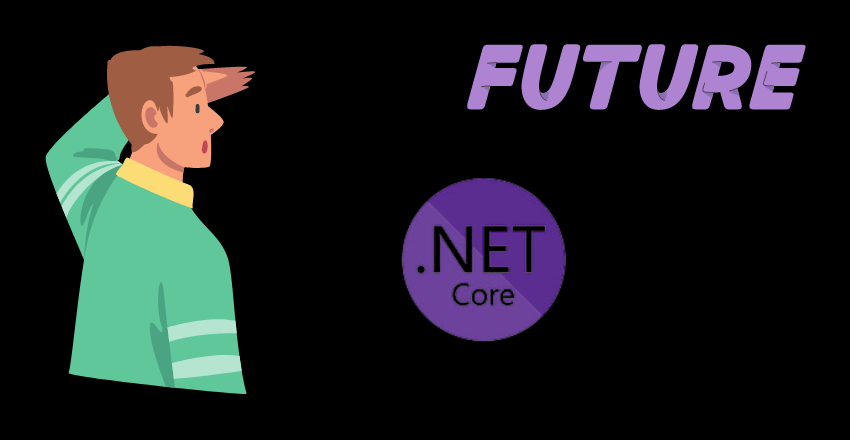 As software development continues to evolve, it’s important to stay informed about the latest advancements in technology. One area that has seen significant growth in recent years is .NET Core development. With its cross-platform capabilities and scalability, .NET Core has become a popular choice for developers.
As software development continues to evolve, it’s important to stay informed about the latest advancements in technology. One area that has seen significant growth in recent years is .NET Core development. With its cross-platform capabilities and scalability, .NET Core has become a popular choice for developers.
But what does the future hold for .NET Core? Predicting the trajectory of .NET Core and anticipating its evolution is crucial for staying ahead in the industry. In this article, we’ll explore the role of .NET Core in upcoming software development trends, discuss the major advancements and updates, and predict the future of .NET Core development.
We’ll also compare .NET Core with other popular frameworks and discuss its strengths and advantages. And, we’ll explore how emerging technologies like cloud computing, artificial intelligence, and Internet of Things (IoT) will impact the future of .NET Core development.
To stay ahead in the industry, it’s important to adapt to these trends. We’ll explore anticipated trends in .NET Core development, including microservices architecture, containerization, and serverless computing. We’ll also discuss the skills and training required for developers to excel in the future of .NET Core development.
So, let’s dive into the future of .NET Core development and explore how you can stay ahead of the curve.
Understanding .NET Core
As the future of software development continues to evolve, it’s important to stay up-to-date with the latest advancements in .NET Core development. But before we dive into the advancements and trends, let’s begin with understanding what .NET Core is and its significance in modern software development.
.NET Core is an open-source, cross-platform framework for building various types of applications such as web, desktop, mobile, gaming, and IoT. It was designed to offer a more modular and flexible approach to software development, allowing developers to pick and choose the components they need to build their application.
One of the key benefits of .NET Core is its ability to run on different platforms, including Windows, Linux, and macOS. This cross-platform compatibility makes it easier for developers to build and deploy applications on a variety of devices without having to recompile the code for each platform.
Let’s take a look at a simple example of how .NET Core works:
//HelloWorld.cs
using System;
class HelloWorld {
static void Main() {
Console.WriteLine(“Hello, World!”);
}
}
This code is written in C# using .NET Core. It’s a simple console application that outputs “Hello, World!” when run. As you can see, the code is concise and easy to read, making it a popular choice for building web applications, data-intensive applications, and machine learning models.
In the next section, we’ll explore the advancements in .NET Core and how they enhance its capabilities.
The Advancements in .NET Core
As we look to the future of .NET Core development, it’s important to consider the advancements and updates that will shape the trajectory of the framework. With each release, .NET Core continues to evolve and improve, enhancing its capabilities and expanding its reach.
One notable advancement is the introduction of .NET 5, which brings together the best of .NET Core and .NET Framework in a single, unified platform. This integration allows for easier compatibility and upgrades between different versions of .NET, saving developers time and effort.
Additionally, .NET Core has made significant improvements in performance and scalability, thanks to features such as multi-threading, asynchronous programming, and optimization techniques. This makes it a strong contender for high-performance applications and services.
Another important trend in .NET Core development is its increased focus on cloud-native applications. As more and more businesses shift to the cloud, the ability to build and deploy cloud-native applications quickly and efficiently is becoming essential. .NET Core has been designed with this in mind, with support for containerization and serverless computing.
To support these and other advancements, the .NET Core community is continually developing new libraries, frameworks, and tools. For example, the ASP.NET Core web framework provides a powerful and flexible platform for building web applications, while the Entity Framework Core simplifies database access and management.
Overall, the advancements in .NET Core are shaping the future of software development, and staying up-to-date with them is crucial for any developer. By predicting the trajectory of .NET Core and leveraging its advancements, developers can build cutting-edge applications and stay ahead of the curve.
.NET Core vs Other Frameworks
When it comes to choosing a framework for software development, there are a number of factors to consider, such as ease of use, performance, and scalability. Comparing .NET Core to other popular frameworks can make it easier to decide which one is best suited for a given project.
.NET Core vs Java
Java has been a dominant force in enterprise software development for many years, but .NET Core is rapidly gaining ground in this area. One key advantage of .NET Core is its cross-platform capabilities, which allow developers to create applications that run on Windows, Linux, and macOS.
| Feature | .NET Core | Java |
|---|---|---|
| Language Support | C#, VB.NET, F# | Java |
| Performance | Slightly faster than Java | Fast, but not as fast as .NET Core |
| Ease of Use | Easy to use with Visual Studio and other IDEs | Requires more setup and configuration |
| Scalability | Can handle large projects with ease | Can be challenging with large projects |
Example code:
C# code to create a simple console application in .NET Core:
using System;
namespace ConsoleApp
{
class Program
{
static void Main(string[] args)
{
Console.WriteLine("Hello, World!");
}
}
}
Java code to create the same console application:
public class Main {
public static void main(String[] args) {
System.out.println("Hello, World!");
}
}
.NET Core vs Node.js
Node.js is a popular choice for web development due to its speed and simplicity. However, .NET Core offers a number of advantages over Node.js, particularly in terms of performance and scalability.
| Feature | .NET Core | Node.js |
|---|---|---|
| Language Support | C#, VB.NET, F# | JavaScript |
| Performance | Fast and efficient | Fast, but can be slower for CPU-intensive tasks |
| Ease of Use | Easy to use with Visual Studio and other IDEs | Easy to learn and use with a simple syntax |
| Scalability | Can handle large projects with ease | Can be challenging with large projects |
Example code:
C# code to create a simple REST API using .NET Core:
using System;
using Microsoft.AspNetCore.Mvc;
namespace WebApp.Controllers
{
[ApiController]
[Route("[controller]")]
public class HelloController : ControllerBase
{
[HttpGet]
public IActionResult Get()
{
return Ok("Hello, World!");
}
}
}
JavaScript code to create the same REST API using Node.js:
const express = require('express')
const app = express()
const port = 3000
app.get('/', (req, res) => {
res.send('Hello, World!')
})
app.listen(port, () => {
console.log(`Example app listening at http://localhost:${port}`)
})
As shown in the examples above, both .NET Core and other frameworks have their own strengths and weaknesses. Developers should choose the framework that best suits their project’s needs and requirements.
Emerging Technologies and .NET Core
As technology continues to evolve at a rapid pace, staying current with the latest advancements is crucial for developers using .NET Core. With the rise of cloud computing, artificial intelligence, and the Internet of Things (IoT), the future of .NET Core development looks promising.
Cloud computing has transformed the way we develop and deploy applications. As more organizations move their workloads to the cloud, .NET Core has become a popular choice due to its cross-platform capabilities and scalability. With .NET Core, developers can easily create applications that run on various cloud platforms such as Microsoft Azure, Amazon Web Services (AWS), and Google Cloud Platform (GCP).
Artificial intelligence (AI) and machine learning (ML) have also gained momentum in recent years, and .NET Core provides developers with the necessary tools to build intelligent applications. With libraries such as ML.NET, developers can easily integrate machine learning capabilities into their applications.
The Internet of Things (IoT) presents an opportunity for developers to create innovative applications that can communicate with connected devices. .NET Core provides the necessary tools to develop IoT applications that can run on various devices and platforms.
A few examples of IoT devices that can be programmed using .NET Core include Raspberry Pi, Windows 10 IoT Core, and Arduino. With .NET Core, developers can easily create applications that communicate with these devices and extract data from them.
As these emerging technologies continue to gain momentum, developers who can adapt and incorporate them into their skill sets will remain in high demand.
Example code:
// Sample code for using Azure Cognitive Services with .NET Core
string subscriptionKey = “1234567890abcdefg”;
string endpoint = “https://westus.api.cognitive.microsoft.com/”;
var client = new HttpClient();
client.DefaultRequestHeaders.Add(“Ocp-Apim-Subscription-Key”, subscriptionKey);
var uri = endpoint + “/text/analytics/v2.0/sentiment”;
var content = new StringContent(“{\”documents\”: [{\”language\”: \”en\”,\”id\”: \”1\”,\”text\”: \”I love .NET Core!\”}]}”, Encoding.UTF8, “application/json”);
var response = await client.PostAsync(uri, content);
var result = await response.Content.ReadAsStringAsync();
Console.WriteLine(result);
Future Trends in .NET Core Development
The future of .NET Core development is rapidly evolving. Predicting the trajectory of .NET Core requires staying up-to-date with the latest advancements and anticipating its evolution. We can expect to see several trends emerging in the coming years that will shape the future of .NET Core development.
1. Microservices Architecture
Microservices architecture is a software development approach that structures an application as a collection of services that are highly maintainable and testable. With .NET Core, developers can easily create microservices-based applications that are scalable and efficient. This trend towards microservices architecture is likely to continue, as it enables developers to build complex applications faster and more reliably.
2. Containerization
Containerization is another trend that is gaining momentum in the software development industry. With .NET Core, developers can easily build and deploy applications as containers. This trend is expected to continue, as containerization provides several benefits to developers, including faster deployment, better resource utilization, and increased scalability.
3. Serverless Computing
Serverless computing is a cloud computing model where the cloud provider manages the infrastructure required to run the code. With .NET Core, developers can easily build and deploy serverless applications that are highly scalable and cost-effective. This trend towards serverless computing is likely to continue, as it provides several benefits to developers, including reduced infrastructure management, automatic scaling, and increased flexibility.
Developers can adapt to these emerging trends by staying up-to-date with the latest developments and learning new skills. For example, learning how to build microservices-based applications or containerized applications using .NET Core can help developers stay competitive in the industry. We can expect to see the .NET Core community continue to grow and evolve, enabling developers to build scalable, efficient, and reliable applications for years to come.
The Role of .NET Core in Web Development
Web development has evolved rapidly over the years, with the emergence of new technologies and frameworks. One such framework that has gained popularity in recent times is .NET Core, which offers a range of features and tools for building web applications.
One of the key strengths of .NET Core is its support for modern web frameworks and libraries, such as React, Angular, and Vue. By integrating these frameworks, developers can build fast, responsive, and dynamic front-end interfaces for their web applications.
Let’s look at an example of how .NET Core can be used to build a web application:
// Define a controller for handling requests
public class HomeController : ControllerBase
{
private readonly ILogger _logger;
public HomeController(ILogger<HomeController> logger)
{
_logger = logger;
}
[HttpGet]
public IActionResult Index()
{
return View();
}
}
In this example, we define a controller for handling HTTP GET requests. The controller simply returns a view, which can be rendered on a web page. The ILogger interface is used for logging purposes, allowing us to track errors or other events that occur in the application.
Overall, the flexibility and power of .NET Core make it an excellent choice for web development projects of any size or complexity. Whether you’re building a simple static website or a dynamic web application with complex back-end logic, .NET Core has the features you need to get the job done.
Scalability and Performance in .NET Core
In the constantly evolving landscape of software development, it is crucial to stay up-to-date with the latest advancements in .NET Core to ensure optimal scalability and performance of applications. With cloud computing and other emerging technologies on the rise, anticipating the evolution of .NET Core becomes increasingly important.
.NET Core offers various features and techniques to address issues with scalability and performance. Here are some essential features:
| Feature | Description |
|---|---|
| Multi-threading | With .NET Core, it is easier to write multi-threaded code without worrying about deadlocks and race conditions. |
| Asynchronous programming | By using asynchronous programming techniques, .NET Core can handle more requests and improve performance by freeing up threads for other tasks. |
| Optimization techniques | With just-in-time (JIT) compilation, .NET Core optimizes code at runtime for better performance. Additionally, it offers tools like the Performance Diagnostic Tool to identify performance bottlenecks. |
By leveraging these features, developers can improve the scalability and performance of their applications. For example, by using asynchronous programming techniques, a web application built with .NET Core can handle thousands of requests per second with minimal resource usage.
Industry examples highlight the importance of scalability and performance. For instance, a case study on Microsoft’s LinkedIn showed a 24% reduction in CPU usage and a 90% reduction in garbage collection pauses after migrating to .NET Core.
Conclusion
Scalability and performance are critical factors in software development, and with the increasing use of cloud computing and other emerging technologies, it is essential to anticipate the evolution of .NET Core and stay up-to-date with the latest advancements. By utilizing the features and techniques offered by .NET Core, developers can ensure optimal performance and scalability of their applications.
The Future of Cross-platform Development with .NET Core
One of the most exciting prospects of .NET core development is its cross-platform capabilities. With .NET Core, developers can create applications that run seamlessly on Windows, macOS, and Linux operating systems. This feature provides a tremendous advantage for businesses looking to expand their reach and deliver their software solutions across multiple platforms.
Predicting the trajectory of .NET Core, we can expect to see an increase in cross-platform development, as more organizations seek to build applications that work across platforms. This trend is further supported by the rising popularity of containerization and microservices architecture, which require applications to be portable across different environments.
Developers can use .NET Core to create cross-platform applications with ease, leveraging its extensive library of cross-platform APIs and supporting tools. For example, building a cross-platform web application using .NET Core is a simple process. Developers can use ASP.NET Core to create a web application that can run on any operating system, with minimal changes required to the codebase.
Moreover, .NET Core allows developers to write code in C# or F#, which are powerful and versatile programming languages with a growing community of developers. This compatibility ensures that developers can continue to use their preferred programming language while leveraging the benefits of .NET Core.
In conclusion, the future of cross-platform development looks bright with .NET Core. By embracing the cross-platform capabilities of .NET Core, developers can create applications that work seamlessly across different operating systems, providing businesses with a powerful tool for expanding their reach and delivering their software solutions to a global audience.
Skills and Training for the Future of .NET Core Development
In order to stay competitive in the ever-evolving world of software development, it is crucial for developers to keep up with the latest trends and advancements in programming languages and frameworks. As .NET Core continues to play an increasingly significant role in upcoming software development trends, developers must be equipped with the necessary skills and training to excel in this area.
One of the key skills required for .NET Core development is a strong understanding of C#, the primary language used for programming with .NET Core. Developers should have a solid grasp of C# syntax, object-oriented programming concepts, and common design patterns.
Along with knowledge of C#, developers should also be familiar with popular web frameworks that are compatible with .NET Core, such as ASP.NET Core and Blazor. These frameworks provide developers with powerful tools for building modern web applications with .NET Core, and a deep understanding of their functionality is essential for successful development.
Other important skills for .NET Core development include proficiency in source control systems like Git, experience with testing and debugging tools, and an understanding of containerization and microservices architecture.
To stay up-to-date with the latest advancements in .NET Core development and acquire these skills, developers should consider participating in online courses, attending workshops and conferences, and engaging with the .NET Core community through forums and online communities.
By investing in their skills and training, developers can position themselves for success in the future of .NET Core development and take advantage of the numerous opportunities this powerful framework provides.
The Future of .NET Core Development
As software development continues to evolve, staying up-to-date with the latest advancements in .NET Core development is crucial for developers to remain competitive in the industry. In this article, we will discuss the trajectory of .NET Core, its role in current and upcoming software development trends, and the skills and training required to excel in the future of .NET Core development.
Understanding .NET Core
.NET Core is an open-source, cross-platform framework that enables developers to build modern, scalable applications for various operating systems. It provides a runtime, libraries, and compilers for building applications, as well as integration with other popular frameworks and languages such as ASP.NET, C#, and F#.
Here is an example of C# code in .NET Core:
using System;
class Program
{
static void Main(string[] args)
{
Console.WriteLine("Hello, World!");
}
}The Advancements in .NET Core
In recent years, .NET Core has undergone major advancements and updates that enhance its capabilities and make it more accessible for developers. These include improvements in performance, security, and features such as new APIs and libraries.
For example, with the release of .NET Core 3.0, developers can now build desktop applications using WinForms and WPF, which were previously only available in the .NET Framework. Here is an example of how to create a WinForms application in .NET Core:
using System;
using System.Windows.Forms;
class Program
{
static void Main(string[] args)
{
Application.Run(new Form1());
}
}.NET Core vs Other Frameworks
When comparing .NET Core with other popular frameworks, such as Java, Node.js, and Ruby on Rails, it has several strengths and advantages. For instance, .NET Core has excellent support for Windows and Visual Studio, as well as superior performance and scalability.
However, other frameworks may be more suitable for specific use cases or have a larger community of developers. Here is an example of Node.js code compared to .NET Core:
//Node.js
const http = require('http');
http.createServer(function (req, res) {
res.writeHead(200, {'Content-Type': 'text/plain'});
res.end('Hello, World!');
}).listen(8080);
//.NET Core
using System;
using System.Net;
class Program
{
static void Main(string[] args)
{
HttpListener listener = new HttpListener();
listener.Prefixes.Add("http://localhost:8080/");
listener.Start();
Console.WriteLine("Listening on http://localhost:8080/...");
while (listener.IsListening)
{
HttpListenerContext context = listener.GetContext();
HttpListenerResponse response = context.Response;
string responseString = "Hello, World!";
byte[] buffer = System.Text.Encoding.UTF8.GetBytes(responseString);
response.ContentLength64 = buffer.Length;
System.IO.Stream output = response.OutputStream;
output.Write(buffer, 0, buffer.Length);
output.Close();
}
listener.Stop();
}
}Emerging Technologies and .NET Core
The future of .NET Core development is intertwined with emerging technologies such as cloud computing, artificial intelligence, and Internet of Things (IoT). These technologies are transforming the way applications are developed and deployed, and developers must adapt to stay ahead.
For instance, .NET Core is well-suited for developing cloud-native applications that can scale dynamically and handle complex workloads. Additionally, with the integration of cognitive services such as speech recognition and natural language processing, .NET Core can facilitate the development of intelligent applications with ease.
Future Trends in .NET Core Development
Moving forward, several trends are expected to shape the future of .NET Core development. These include microservices architecture, containerization, and serverless computing, among others.
Developers can adapt to these trends by incorporating cloud services, utilizing containerization tools such as Docker, and leveraging serverless computing platforms like Azure Functions. Here is an example of how to create an Azure Function in .NET Core:
using System;
using Microsoft.Azure.WebJobs;
using Microsoft.Azure.WebJobs.Host;
using Microsoft.Extensions.Logging;
public static class Function1
{
[FunctionName("Function1")]
public static void Run([TimerTrigger("0 */5 * * * *")]TimerInfo myTimer, ILogger log)
{
log.LogInformation($"C# Timer trigger function executed at: {DateTime.Now}");
}
}The Role of .NET Core in Web Development
When it comes to web development, .NET Core has become increasingly popular due to its support for modern web frameworks and libraries. These include Angular, React, and Vue, as well as server-side frameworks such as ASP.NET Core.
With these tools, developers can build responsive and interactive web applications with ease. Here is an example of how to create a simple web application using ASP.NET Core:
dotnet new webapp -o mywebappScalability and Performance in .NET Core
Scalability and performance are essential considerations in software development, and .NET Core provides several features to address these challenges. These include multi-threading, asynchronous programming, and optimization techniques such as JIT (Just-In-Time) compiling.
Additionally, by utilizing caching and load-balancing techniques, developers can further optimize the performance of their applications. Here is an example of how to use async/await in .NET Core:
using System;
using System.Net.Http;
using System.Threading.Tasks;
class Program
{
static async Task Main(string[] args)
{
using var client = new HttpClient();
var response = await client.GetAsync("https://www.example.com");
var content = await response.Content.ReadAsStringAsync();
Console.WriteLine(content);
}
}The Future of Cross-platform Development with .NET Core
One of the most significant advantages of .NET Core is its cross-platform capabilities, allowing developers to build applications that run seamlessly on various operating systems. This allows for greater flexibility and scalability, as well as the ability to target a wider audience.
Here is an example of how to build a cross-platform desktop application using .NET Core:
dotnet new wpf -o myappSkills and Training for the Future of .NET Core Development
As the landscape of software development continues to evolve, developers must invest in acquiring new skills and training to remain competitive. This can include attending conferences, workshops, and online courses, as well as staying informed about the latest advancements in frameworks and technologies.
Additionally, developers can benefit from collaborating with others and participating in open-source projects to improve their skills and gain practical experience. Resources such as Microsoft Learn and official .NET Core documentation can also provide valuable insights and guidance.
Conclusion
In conclusion, the future of .NET Core development looks promising, with advancements in performance, scalability, and cross-platform capabilities. By understanding these developments and staying up-to-date with the latest trends and skills, developers can continue to thrive and succeed in the ever-changing landscape of software development.
FAQ
Q: What is .NET Core?
A: .NET Core is an open-source, cross-platform framework for building modern applications. It provides a flexible and efficient environment for developing software across various platforms and devices.
Q: How does .NET Core differ from other frameworks?
A: .NET Core offers numerous advantages over other frameworks, including its cross-platform compatibility, performance optimization features, and support for modern web frameworks. It is designed to meet the evolving needs of developers in today’s software development landscape.
Q: What are the major advancements in .NET Core?
A: .NET Core has seen significant advancements in areas such as performance optimization, scalability, and cross-platform compatibility. These advancements have greatly enhanced its capabilities and made it a preferred choice for building modern applications.
Q: How can .NET Core address scalability and performance challenges?
A: .NET Core offers features like multi-threading, asynchronous programming, and optimization techniques that help improve scalability and performance. By leveraging these features, developers can build applications that can handle high traffic loads and deliver optimal performance.
Q: What is the future of .NET Core development?
A: The future of .NET Core development is expected to involve trends such as microservices architecture, containerization, and serverless computing. Developers need to adapt to these trends and stay updated with the evolving landscape to remain competitive in the industry.
Q: How does .NET Core support cross-platform development?
A: .NET Core has cross-platform capabilities, allowing developers to build applications for various operating systems, including Windows, macOS, and Linux. This flexibility makes it an ideal choice for developers targeting multiple platforms.
Q: What skills and training are required for .NET Core development?
A: To excel in .NET Core development, developers should have a strong understanding of C# programming language, familiarity with modern web frameworks, and knowledge of best practices for building scalable and performant applications. Staying updated with the latest advancements in .NET Core is also crucial.

Gordon is a distinguished technical author with a wealth of experience in software development, specializing in .NET C#. With a career spanning two decades, he has made significant contributions as a programmer and scrum master at prestigious organizations like Accenture and Boston Consulting Group, where he has played a pivotal role in delivering successful projects.
Since the release of .NET C# in 2001, Gordon’s passion for this powerful programming language has been unwavering. Over the past 20 years, he has honed his expertise in .NET C# development, exploring its vast capabilities and leveraging its robust features to create cutting-edge software solutions. Gordon’s proficiency extends to various domains, including web applications, desktop software, and enterprise systems.
As a technical author, Gordon remains committed to staying at the forefront of technological advancements, continuously expanding his skills, and inspiring fellow technologists. His deep understanding of .NET C# development, coupled with his experience as a programmer and scrum master, positions him as a trusted resource for those seeking guidance and expertise. With each publication, Gordon strives to empower readers, fuel innovation, and propel the field of scientific computer science forward.






